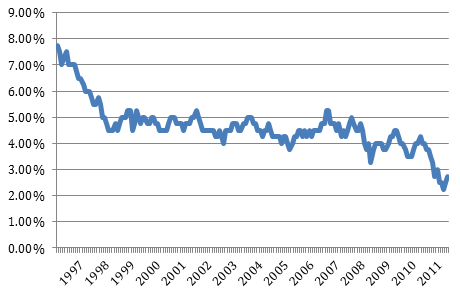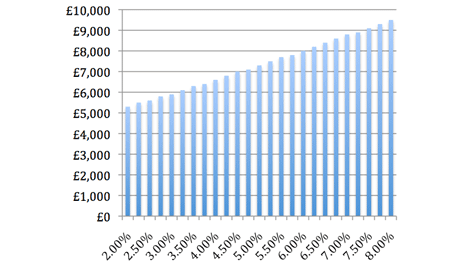Mervyn King is wrong - QE is bad for pensioners
The governor of the Bank of England thinks quantitative easing is having no detrimental effects on pensions. But he's wrong, says Phil Oakley. It is hammering pensioners' incomes.
Get the latest financial news, insights and expert analysis from our award-winning MoneyWeek team, to help you understand what really matters when it comes to your finances.
You are now subscribed
Your newsletter sign-up was successful
Want to add more newsletters?

Twice daily
MoneyWeek
Get the latest financial news, insights and expert analysis from our award-winning MoneyWeek team, to help you understand what really matters when it comes to your finances.

Four times a week
Look After My Bills
Sign up to our free money-saving newsletter, filled with the latest news and expert advice to help you find the best tips and deals for managing your bills. Start saving today!
The Bank of England has created £325bn out of fresh air quantitative easing (QE), as economists like to call it to try to bolster the British economy in the wake of the credit crunch.
Was it the right thing to do? That depends on who you talk to. Supporters say without it, the economy would have collapsed into a depression. Detractors point to the threat of inflation, and the negative impact on final salary pension funds.
Mervyn King, the governor of the Bank of England, thinks the detractors are wrong. On Tuesday, at a hearing of the House of Lords' Economic Affairs Committee, he said: "I'm concerned about what has happened to the pensions industry and defined benefit pensions but I think they reflect a wider set of issues. The decline cannot be laid at the door of our [QE] programme. It might not have had quite such as big an effect as some people think."
MoneyWeek
Subscribe to MoneyWeek today and get your first six magazine issues absolutely FREE

Sign up to Money Morning
Don't miss the latest investment and personal finances news, market analysis, plus money-saving tips with our free twice-daily newsletter
Don't miss the latest investment and personal finances news, market analysis, plus money-saving tips with our free twice-daily newsletter
The National Association of Pension Funds (NAPF) disagrees. It takes a very dim view of QE. It reckons the last £50bn of QE added £45bn to the deficits of UK companies' final salary pension funds.
So who's right? To answer this question, we need to have a look at the economics of pension fund valuation.
How final salary pension funds are valued
Pension fund assets are typically valued in two ways. One method is to just take the market value of the assets shares, bonds, property, and cash. Another method is for an actuary to perform a detailed valuation, taking into account different time periods, interest rates, rents and dividends known as an actuarial valuation.
As far as Mr King is concerned, he may be thinking of the impact that QE has had on asset values. Without QE, as far as he is concerned, stock markets and bond prices might have collapsed. From this point of view, QE has actually been beneficial to pension funds.
Given the rally in gilts and corporate bond prices over the last three years, there's almost certainly some truth to this argument. Yes, it's hard to quantify no-one really knows where the FTSE 100 would have ended up without QE but it's certainly had an effect.
Where the issue becomes more contentious, is the impact that QE has had on the value of pension fund liabilities. These depend on things such as final salaries, life expectancy and future rates of inflation. Once estimated, these future liabilities are converted to values in today's money (present values) by discounting them at a rate of interest.
The rate of interest used typically reflects the bond yields on good quality corporate bonds (typically AA' rated bonds). As QE has driven down the yields of government bonds, corporate bonds yields have gone down as well. The end result? The present value of many pension fund liabilities has increased (the lower the discount rate, the higher the present value).
Mr King may be right that other factors such as increased life expectancy have increased liabilities. But lower interest rates have had a very powerful influence. And according to organisations like the NAPF, this effect has more than offset the boost to assets from QE which is why deficits (the difference between asset values and liabilities) are going up.
Why is this important?
Pension fund deficits are a big problem. Only last week, BT announced that its pension fund deficit was £4.1bn and that it was making a one-off payment of £2bn into its final salary pension fund.
Luckily for BT, it can afford to do this. But companies with less financial strength may struggle to deal with big deficits. You see, pension fund deficits are like debt - they are real liabilities that have to be paid. Big deficits have to be addressed and can seriously threaten a company's ability to pay dividends (because cash has to go to pension funds rather than shareholders) or even the solvency of the company itself.
This is why final salary pension schemes are being phased out and the benefits to members being cut. As if saving for retirement wasn't hard enough already, many scheme members will now get less money than they thought they would when they retire.
QE is hammering pensioner's incomes
Arguably QE has also pushed up living costs by devaluing the pound (increasing the cost of imported goods) and encouraging speculation on the commodities markets. This is hard for people on fixed incomes such as pensioners.
But worse still, by pushing down bond yields, QE has drastically reduced the amount of money that a pension fund will buy. Have a look at the chart below.
Government Actuary Department (GAD) rates

Source: HMRC
It shows the rates from the Government Actuary Department (GAD). These rates are based on medium/long government bond yields and are used to determine the maximum amount of income that can be taken from a pension every year or income drawdown.
In March 2009, when the Bank of England first launched QE, GAD rates were 4% (as they were in May last year too). The same rate is 2.5% today, and will rise to 2.75% in April.
But what does this mean?
It means that the maximum income drawdown for a 65-year-old man with a £100,000 pension pot has fallen from £6,600 to £5,600 a decline of 15%. But the effect is arguably worse than that.
Maximum pension income versus GAD rates

You see, QE is keeping bond yields artificially low by buying gilts at high prices. In more normal economic times, gilt yields are usually 2-2.5 percentage points higher than the rate of inflation.
With the Retail Price Index currently rising at an annual rate of 3.7%, this would suggest a "normalized" medium term bond yield should be around 6.2%. But QE means that the real yields on gilts are negative today they are below the rate of inflation.
Now, if interest rates were at more normal' levels, that would probably do lots of damage to a fragile UK economy. For pensioners though, it might mean a potential annual income drawdown from their pension fund of £8,200 per year or 46% more than some are getting now. The amounts provided by annuities have also suffered because of this.
So while Mervyn King is entitled to his views about QE, it would seem that pensioners' whining' is amply justified.
Get the latest financial news, insights and expert analysis from our award-winning MoneyWeek team, to help you understand what really matters when it comes to your finances.
Phil spent 13 years as an investment analyst for both stockbroking and fund management companies.
-
 Should you buy an active ETF?
Should you buy an active ETF?ETFs are often mischaracterised as passive products, but they can be a convenient way to add active management to your portfolio
-
 Power up your pension before 5 April – easy ways to save before the tax year end
Power up your pension before 5 April – easy ways to save before the tax year endWith the end of the tax year looming, pension savers currently have a window to review and maximise what’s going into their retirement funds – we look at how